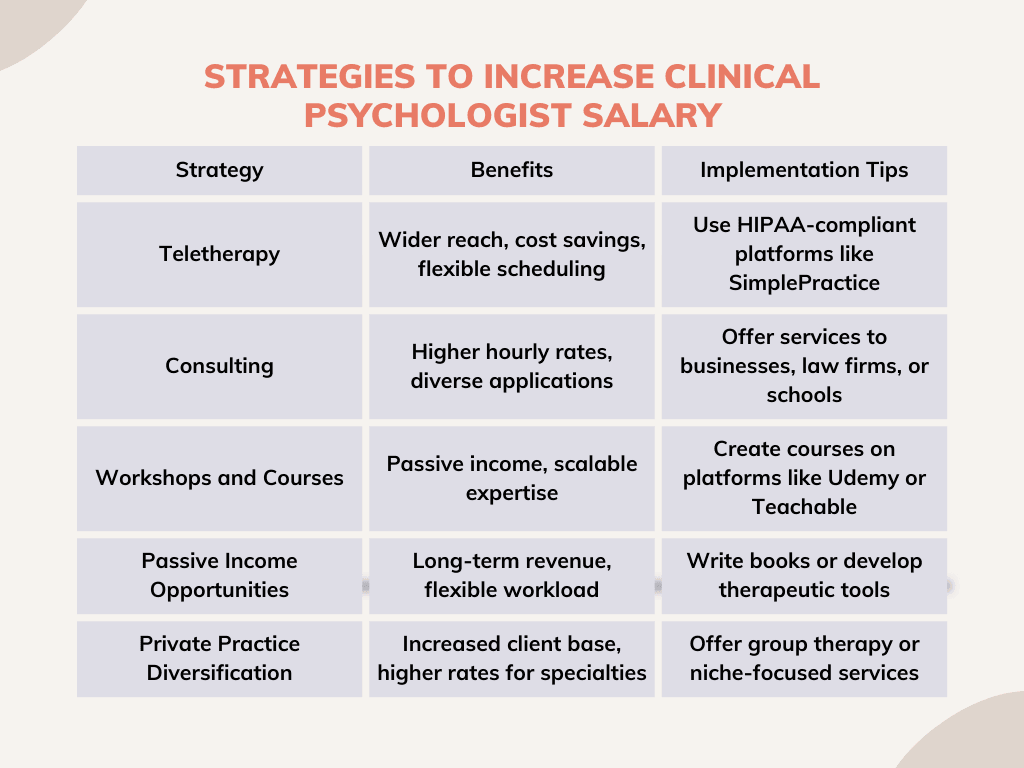Are you a clinical psychologist looking to boost your salary without extending your working hours?
Being a clinical psychologist is rewarding and demanding, especially when managing long hours and striving for financial growth. Many professionals in this field face challenges like burnout while trying to boost their salary. However, increasing your earnings doesn’t always mean working longer hours. By diversifying income streams and leveraging your expertise, you can enhance your salary while maintaining a healthy work-life balance.
This article explores strategies to increase your income as a clinical psychologist, highlighting opportunities such as teletherapy, consulting, workshops, and passive income options.

1. Maximizing Your Clinical Psychologist Salary Without Overworking
Clinical psychologists often struggle with the desire to increase their income without sacrificing their well-being. While taking on additional clients or working longer hours might seem the most straightforward way to make more money, this can lead to burnout, reduced job satisfaction, and, ultimately, poorer client outcomes.
Why Burnout Is a Common Concern for Clinical Psychologists
Burnout among mental health professionals is a well-documented issue. The emotional intensity of the work, combined with long hours, can make it challenging to maintain a sustainable pace. Burnout can result in fatigue, diminished empathy, and even personal health issues, all of which affect your ability to provide effective therapy. For more tips on overcoming burnout and advancing your healthcare career, check out this helpful guide here.
Fortunately, you can increase your income without jeopardizing your health or personal time. The key is to explore alternative revenue streams that align with your expertise but don’t require additional clinical hours.
2. Teletherapy: A Game-Changer for Clinical Psychologist Salary Growth
Offering teletherapy services provides a convenient way to enhance your income without adding to your workload. Providing virtual therapy services allows you to lower the expenses tied to a physical office while enhancing flexibility for both you and your clients (For more detailed insights, you can explore the full article here: Boost Telemedicine Salary by 30% Fast).
Benefits of Teletherapy
- Wider Client Reach: Teletherapy enables you to reach clients residing in remote locations or those with limited access to in-person therapy services. This expands your potential client base without the need for a physical presence.
- Flexibility: Teletherapy allows you to schedule sessions around your personal life, potentially reducing no-shows and cancellations since clients don’t have to travel.
- Cost Savings: Operating virtually can reduce office rent, utilities, and commuting costs, allowing you to earn more.
How to Get Started with Teletherapy
- Choose a HIPAA-Compliant Platform: It’s essential to select a platform that meets legal and ethical requirements for confidentiality, such as Zoom for Healthcare, Doxy: me, or SimplePractice.
To begin offering teletherapy, select a HIPAA-compliant platform like SimplePractice that ensures confidentiality and meets legal standards for virtual therapy.
- Set Clear Boundaries: To avoid overextending yourself, be intentional about setting limits on when and how often you will offer teletherapy services. This approach supports a balanced lifestyle and helps prevent burnout (For more tips on overcoming burnout and advancing your healthcare career, check out this helpful guide here).

For more insights on increasing earnings in the healthcare sector, read our article on How to Boost Your Clinical Psychologist Salary, which shares practical strategies that can apply to other medical specialties.
3. Branch Out into Consulting
Consulting is a highly lucrative field that allows clinical psychologists to leverage their expertise in new ways. Whether working with businesses, law firms, schools, or community organizations, consulting enables you to diversify your income while using your psychological skills outside of a traditional therapy setting.
Types of Consulting Opportunities for Clinical Psychologists
- Corporate Consulting: Offer services to companies seeking help with employee mental health, workplace dynamics, or leadership development. Many corporations are investing more in mental health initiatives, which can be an ideal opportunity for clinical psychologists.
- Legal Consulting: Act as an expert witness in legal cases, providing psychological assessments or offering testimony on mental health issues relevant to court cases. Forensic psychology is a growing field with lucrative opportunities for experienced clinicians.
- Educational Consulting: Work with schools and academic institutions to develop programs for student mental health, bullying prevention, or emotional resilience training.
How Consulting Can Boost Your Income
Consulting services typically pay more per hour than clinical work, and the time commitment is often flexible. You can take on as many or as few consulting gigs as you’d like, increasing your income without taking on more therapy clients.
4. Create and Sell Workshops or Courses
If you have specialized knowledge in some regions of psychology, consider developing workshops, courses, or training programs. These can be delivered online or in person and are an excellent way to reach a larger audience while earning passive income.
Types of Workshops and Courses to Consider
- Mental Health Workshops: Create workshops on stress management, mindfulness, or coping strategies for companies, schools, or the general public. These can be tailored for different audiences and offered multiple times with little additional work on your part.
- Professional Development for Therapists: Offer continuing education workshops for other mental health professionals. This can include training on specific therapeutic techniques or guidance on building a private practice.
- Online Courses: Develop an online course that people can purchase and complete at their own pace. Websites like Udemy or Teachable offer easy ways to create and sell courses. Once the course is made, it can provide ongoing passive income.
Platforms like Udemy and Teachable provide easy ways to develop and sell online courses, allowing you to earn passive income by sharing your expertise.
The Financial Benefits of Workshops and Courses
Creating workshops or courses allows you to scale your expertise. Instead of working with one client at a time, you can work with groups or offer recorded materials that require little ongoing effort. This helps maximize your income while minimizing the need to spend additional hours in direct client care.
5. Exploring Passive Income Streams to Supplement Your Clinical Psychologist Salary
Passive income involves earning money without actively trading your time for it. For clinical psychologists, this could include writing books, developing digital resources, or creating tools that others can use in their practice.
Ideas for Passive Income as a Clinical Psychologist
- Write a Book: If you have expertise in a particular area of psychology, writing a book can establish you as a thought leader while generating royalties. You can write about therapeutic techniques, mental health strategies, or personal growth.
- Develop Therapeutic Tools: Consider creating tools or resources other therapists or clients can use, such as guided journals, worksheets, or therapeutic games. You can sell these online via platforms like Etsy or your own website.
- Affiliate Marketing: If you run a blog or website related to psychology, you can earn money by partnering with companies. You can earn big commissions for your affiliate links by promoting relevant products and services.
The Long-Term Benefits of Passive Income
While passive income streams require initial effort, they can continue to generate revenue long after you’ve created the product. This approach is especially advantageous for clinical psychologists seeking a consistent income stream while cutting back on active practice hours.

6. Diversify Your Private Practice
If you’re already running a private practice, consider ways to diversify your services. You can increase your revenue without overloading your schedule by offering new services to your existing clients.
Strategies to Diversify Your Private Practice
- Providing group therapy enables you to support multiple clients at once, making the most of your time. This is particularly effective for clients with similar issues, such as anxiety, addiction, or grief.
- Niche Specialization: Consider specializing in a specific area, such as trauma therapy, child psychology, or LGBTQ+ mental health. Specialists often charge higher rates because of their expertise in a particular field.
- Sliding Scale Options: While it may seem counterintuitive, offering sliding scale services can attract more clients who might otherwise avoid therapy due to cost concerns. This can increase your overall caseload and revenue.
Why Diversifying Increases Income
Offering a broader range of services allows you to tap into different markets and attract clients who may not have been interested in individual therapy. Working with groups will enable you to charge more for specialized services or increase your income.

FAQ about Strategies to Boost clinical psychologist’s Salary
Q1: How can teletherapy help clinical psychologists increase their salary?
Teletherapy expands your client base by reaching remote locations and reducing costs associated with maintaining a physical office.
Q2: What consulting opportunities are available for clinical psychologists?
Clinical psychologists can explore corporate mental health consulting, legal expert witness roles, and educational program development.
Q3: How do workshops and courses generate passive income?
Workshops and courses allow psychologists to reach larger audiences at once or sell recorded materials repeatedly, generating income with minimal ongoing effort.
Q4: What are some examples of passive income streams for clinical psychologists?
Examples include writing books, developing therapeutic tools, and affiliate marketing for mental health products and services.
Q5: How can diversifying a private practice boost income?
Offering specialized services or group therapy sessions can attract more clients and enable higher rates for expertise.

Conclusion: Achieving Financial Success as a Clinical Psychologist [Strategies to Boost Salary]
Earning more as a clinical psychologist is possible without increasing your hours. By exploring alternative revenue streams, such as teletherapy, consulting, workshops, passive income, and diversifying your private practice, you can boost your income while maintaining a balanced workload.
The key is to leverage your expertise in new ways, whether through virtual platforms, group settings, or niche specializations. You can achieve financial growth without sacrificing your well-being with careful planning and strategic choices.
I am looking for more ways to advance your psychology career. Read another article here to discover additional career-boosting strategies.








2 réflexions au sujet de “Clinical Psychologist Salary [Boost Your Earnings Without Burnout]”